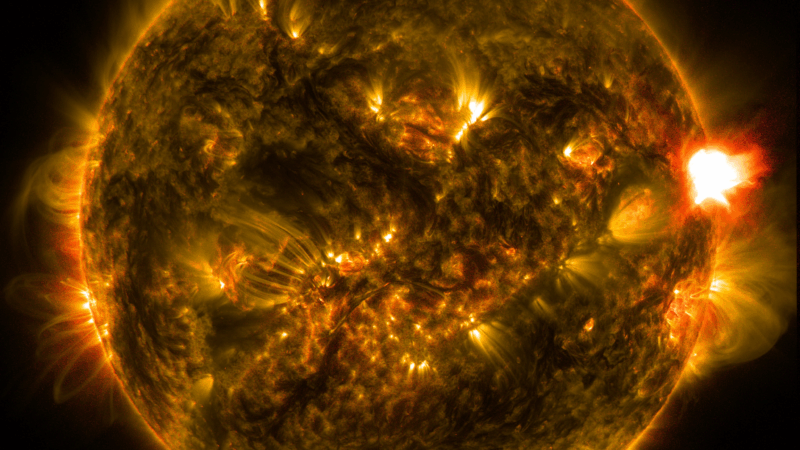Why solar flares are way hotter than researchers thought
Beautiful yet dangerous solar flares that erupt from the sun could be as hot as 180 million degrees Fahrenheit, researchers say.
That’s more than six times hotter than solar physicists previously believed, according to a new report in Astrophysical Journal Letters.
Alexander Russell, a physicist with the University of St. Andrews in Scotland, called that temperature “a crazy number” that he and his colleagues found “incredible.”
Solar flares occur when magnetic energy gets suddenly released and dumped into particles. These particles, ions and electrons, get heated up and shoot out at great speed.
Previously, researchers used telescopes to measure the temperature of electrons in solar flares. “And we’ve kind of just assumed, well, the ion temperature would be the same as the electron temperature,” says Russell.
But recent computer simulations and measurements in near-Earth space suggest that this assumption is wrong: They show that ions heat up way more.
Russell and his colleagues did some calculations and found that solar flares could actually be over 100 million degrees Fahrenheit, and quite possibly hotter.
James Drake, a physicist at the University of Maryland who wasn’t part of this research team, has been studying how magnetic processes heat and speed up electrons and ions for some time. He says until now, the difference between the two has been overlooked when it comes to solar flares.
“We’ve been confronting the solar physicists,” says Drake, “telling them that even though they’ve measured in a lot of detail what’s going on with the electrons, they’re missing something big.”
That’s why he says he was happy to see this new analysis, as it could lead to a better understanding of how solar flares work. And that in turn could help protect hardware like satellites and people like astronauts from these dangerous but awesome eruptions.
“We’re already busy on the next steps,” says Russell, who says they’re developing models of how flares evolve when the ions are heated more strongly than the electrons.
U.K. leader’s chief of staff quits over hiring of Epstein friend as U.S. ambassador
British Prime Minister Keir Starmer's chief of staff resigned Sunday over the furor surrounding the appointment of Peter Mandelson as U.K. ambassador to the U.S. despite his ties to Jeffrey Epstein.
Trump administration lauds plastic surgeons’ statement on trans surgery for minors
A patient who came to regret the top surgery she got as a teen won a $2 million malpractice suit. Then, the American Society of Plastic Surgeons clarified its position that surgery is not recommended for transgender minors.
Sunday Puzzle: -IUM Pandemonium
NPR's Ayesha Rascoe plays the puzzle with KPBS listener Anthony Baio and Weekend Edition Puzzlemaster Will Shortz.
Thailand counts votes in early election with 3 main parties vying for power
Vote counting was underway in Thailand's early general election on Sunday, seen as a three-way race among competing visions of progressive, populist and old-fashioned patronage politics.
US ski star Lindsey Vonn crashes in Olympic downhill race
In an explosive crash near the top of the downhill course in Cortina, Vonn landed a jump perpendicular to the slope and tumbled to a stop shortly below.
For many U.S. Olympic athletes, Italy feels like home turf
Many spent their careers training on the mountains they'll be competing on at the Winter Games. Lindsey Vonn wanted to stage a comeback on these slopes and Jessie Diggins won her first World Cup there.








